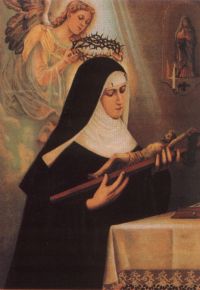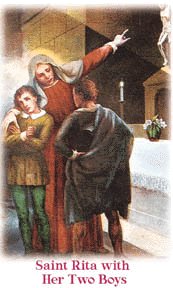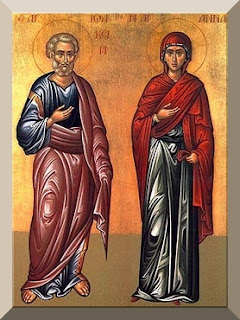
Rita Lotti was born in the year 1381, her parents, Antonio and Amata were very devout Catholics and taught Rita a love of God and the Church from a very young age. The young Rita was much loved by her parents and from them she learnt to have an intense devotion to our suffering Lord.
This would prove to be providential for throughout her life, Rita would be touched by tragedy and grief, it was if God Himself would pierce her soul in order to share in His suffering, this was an honour given to few, but Rita was one of those holy souls.
Rita though she longed to become a Religious instead bowed to her parents decision that she marry, being that she was an obedient daughter to both her parents and the Church, Rita consented in all humility to her parents wishes. This brought relief to both Antonio and Amata Lotti as they had worried that a Religious life would be too difficult for Rita to live, especially as the Church seemed to be under attack by certain political elements.
Rita married Paolo Mancini at a very young age and though Paolo would not prove to be an ideal husband, he tried through his wife's influence to overcome his fiery temper. They would be blessed with the birth of twin sons who seemed to have inherited their fathers tempestuous nature, but through it all Rita maintained her love for God and the Sacraments of the Church.
This was one very strong woman, who though her husband at times ill treated her, she bore him no ill will and instead returned only love to this volatile husband of hers. Rita grasped that in order to set a good and holy example she would have to excel at patience, fortitude , courage and humility, she did this with natural ease, as these very Gifts were inherent in her nature. This wife and mother lived an ordinary life of daily chores of cooking, cleaning, laundry and other sundry housework in order to maintain the upkeep of her home.
Though Rita would suffer at the hands of her volatile husband she never resented him but simply prayed that he would find the peace of heart that she had in abundance. Paolo did try to follow in his wife's lead but unlike Rita, he had a difficult time controlling his temper, and maintaining his decorum through the social upheavals in his region.
This inability to control his temper and mind his tongue may have led to an act of vengeance when Paolo was murdered as he was returning back home after his daily work was finished. The death of her husband in such an unfortunate and tragic way deeply grieved Rita, as she prayed for the soul of her husband and also the salvation of the man who had killed her beloved husband.
What also troubled Rita was the tradition of avenging a loved one's death and though Rita grieved her husbands untimely death, she herself wished no harm to come to his assailant, this position though was not shared by her sons. Though Rita had brought up her sons to love God and the Church, she was also fighting against a society that cultivated vengeance. Her boys themselves were heart sore at the death of their father, listened to the whispers of revenge rather than the loving and forgiving words of their mother.
It is here that Rita's real strength of character and her total Faith in God took over as her sons seemed bent on avenging their fathers death, and ignored all her entreaties to desist from this perilous path. The boys had closed their hearts to their mothers pleading, so began the boys decision to avenge their fathers death.

Rita as she always did, prayed with great zeal to God that He would not allow her beloved sons to have a mortal sin on their souls. And so it was that both her sons died, before they could complete their mission of avenging their fathers murder.
With the death of her family this left Rita alone in the world and though she grieved the loss of her husband and her beloved boys, she also had peace of heart knowing that her sons had not taken a life for a life. As the days, weeks and months rolled by Rita dedicated her life to prayer and good works.
Still, the longing to become a Religious had never left her and after she had tried to enter the Religious Community of the Augustinian Nuns, this caused some concern for the Superiors in that members of the man who had murdered her husband were living in the Convent walls. After being refused numerous times, Rita then approached the relatives of those who had murdered Paolo and also to her own in laws to request that both sides forgive as our Lord desired them too.
This would prove the last hurdle as Rita's love of God and her forgiveness of those who had wronged her left all with a deep imprint of this woman's strong Faith and love of God and her fellow man. Upon the warring families reconciliation with each other, this allowed Rita to enter the Community Augustinian Sisters.
From here on Sister Rita led a life of prayer, mortifications, self service to the poor and ill and also worked within the Convent attending to her daily duties as a Religious Sister. This most courageous Sister truly epitomised the meaning of self giving love for the sake of love itself.
Perhaps this is why our Lord blessed Sister Rita with the singular gift shared by only a few Holy souls, a wound of the stigmata, as a thorn pierced her head, as she knelt in prayer. Once again Rita bore out this pain in silence as she spent her days contemplating the Crucified Lord, and prayed for the salvation of souls.
This remarkable woman truly embodied what it is to live one's Faith irrespective of the conditions one lives in, as she had often been on the receiving end of her volatile husbands temper and endured the loss of her beloved sons. Through all this not once did Rita complain of her lot, but rather offered up all her pain and suffering to her Lord and Saviour.
Sister Rita died in 1457.
Saint Rita was canonized in 1900 by Pope Leo XIII.
Peace of Christ to ALL
Copyright © 2006 Marie Smith. All rights reserved.






